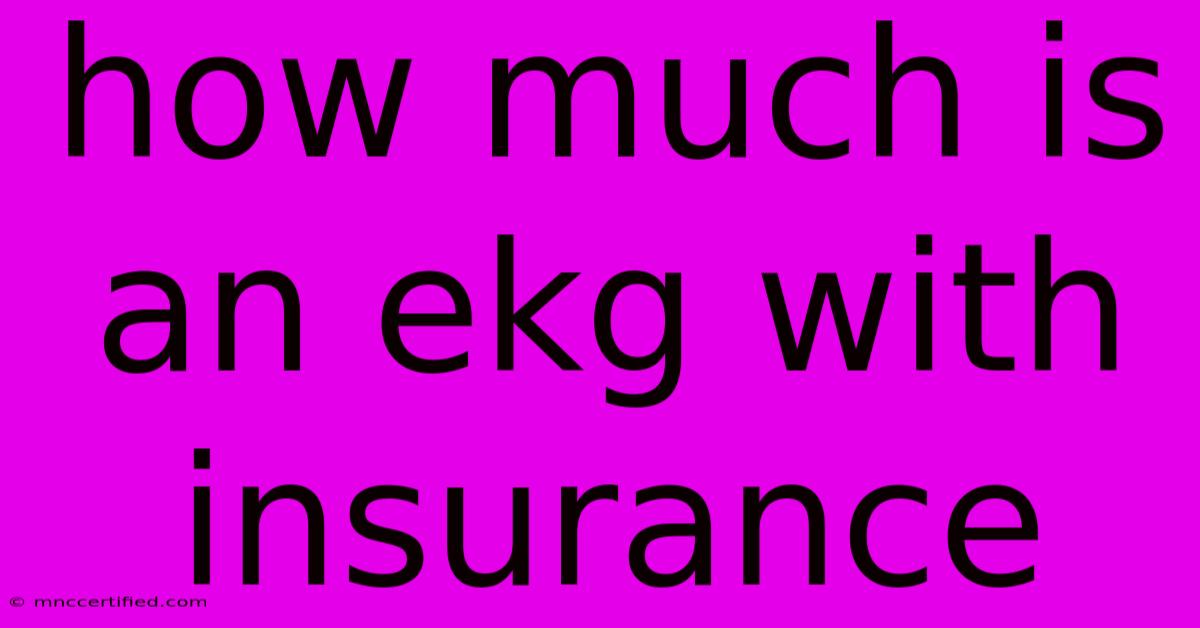How Much Is An Ekg With Insurance

Table of Contents
How Much is an EKG with Insurance? A Comprehensive Guide
Getting an electrocardiogram (EKG or ECG) is a common medical procedure, but understanding the cost, especially with insurance coverage, can be confusing. This comprehensive guide breaks down the price of an EKG with insurance, factors influencing the cost, and steps to minimize your out-of-pocket expenses.
Understanding the Cost of an EKG
The cost of an EKG without insurance can vary significantly depending on the location (hospital, clinic, doctor's office), and whether it's a routine or emergency procedure. You could expect to pay anywhere from $50 to $250 or more. This price often doesn't include any associated doctor's visit fees.
However, most people have health insurance that covers at least a portion of the EKG cost. The exact amount your insurance covers depends on several factors we'll explore below.
Factors Affecting the Cost of an EKG with Insurance
Several factors influence how much you'll pay for an EKG with insurance:
1. Your Insurance Plan:
- Type of Plan: A PPO (Preferred Provider Organization) plan generally offers more flexibility in choosing providers but might have higher out-of-pocket costs compared to an HMO (Health Maintenance Organization). HMOs typically require you to see in-network providers but often have lower costs.
- Deductible: You'll need to meet your annual deductible before your insurance company starts covering most services. If your deductible is high, you might pay a larger portion of the EKG cost upfront.
- Copay: Once you've met your deductible, you'll likely have a copay, a fixed amount you pay for each visit or service. This copay for an EKG can vary widely, ranging from a few dollars to several tens of dollars.
- Coinsurance: After your deductible is met, coinsurance is your share of the costs. It's usually a percentage (e.g., 20%) of the allowed amount.
- Out-of-Pocket Maximum: This is the maximum amount you'll pay out-of-pocket for covered services in a plan year. Once you reach your out-of-pocket maximum, your insurance covers 100% of the remaining costs.
2. The Location of the EKG:
The cost of an EKG can vary depending on where it's performed. Hospitals generally charge more than clinics or a doctor's office. This is due to higher overhead costs.
3. Type of EKG:
A standard EKG is relatively inexpensive. However, more specialized EKGs, such as a holter monitor (a portable EKG worn for 24-48 hours) or a stress test EKG (performed during exercise), will typically cost more. These advanced tests require more time and specialized equipment.
4. Medical Necessity:
Insurance companies are more likely to cover the full cost of an EKG if it's deemed medically necessary by your doctor. If the EKG is considered elective or non-essential, your coverage might be less comprehensive.
Minimizing Your Out-of-Pocket Costs
Here are some tips to keep your out-of-pocket costs as low as possible:
- Check your insurance coverage: Before scheduling the EKG, contact your insurance provider to verify your coverage, copay, and any pre-authorization requirements. This will give you a clearer idea of your potential costs.
- Use in-network providers: If you have an HMO plan, using in-network providers is crucial to minimize costs. Even with a PPO, using in-network providers often leads to lower out-of-pocket expenses.
- Shop around: Compare prices from different clinics and hospitals before scheduling your EKG, especially if you have a PPO plan.
- Negotiate: In some cases, you can negotiate the price of the EKG, especially if you're paying out-of-pocket or have a high deductible.
- Consider a financial assistance program: If you're struggling to afford the EKG, inquire about financial assistance programs offered by the healthcare provider or through your insurance company.
Conclusion
The cost of an EKG with insurance varies significantly. Understanding your insurance plan, choosing in-network providers, and understanding the factors discussed above will help you better prepare for the costs associated with this vital diagnostic procedure. Always confirm the costs with your insurance provider and the healthcare facility before scheduling your appointment. Remember, proactive communication is key to managing your healthcare expenses effectively.

Thank you for visiting our website wich cover about How Much Is An Ekg With Insurance. We hope the information provided has been useful to you. Feel free to contact us if you have any questions or need further assistance. See you next time and dont miss to bookmark.
Featured Posts
-
Can You Take Your Name Off A Bond
Nov 18, 2024
-
Peter Kay Belfast New Date Announced
Nov 18, 2024
-
Active Shooter Insurance Coverage
Nov 18, 2024
-
Darts Results Littler Beats Lukeman
Nov 18, 2024
-
Trash Garden Leads To Eviction
Nov 18, 2024